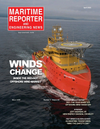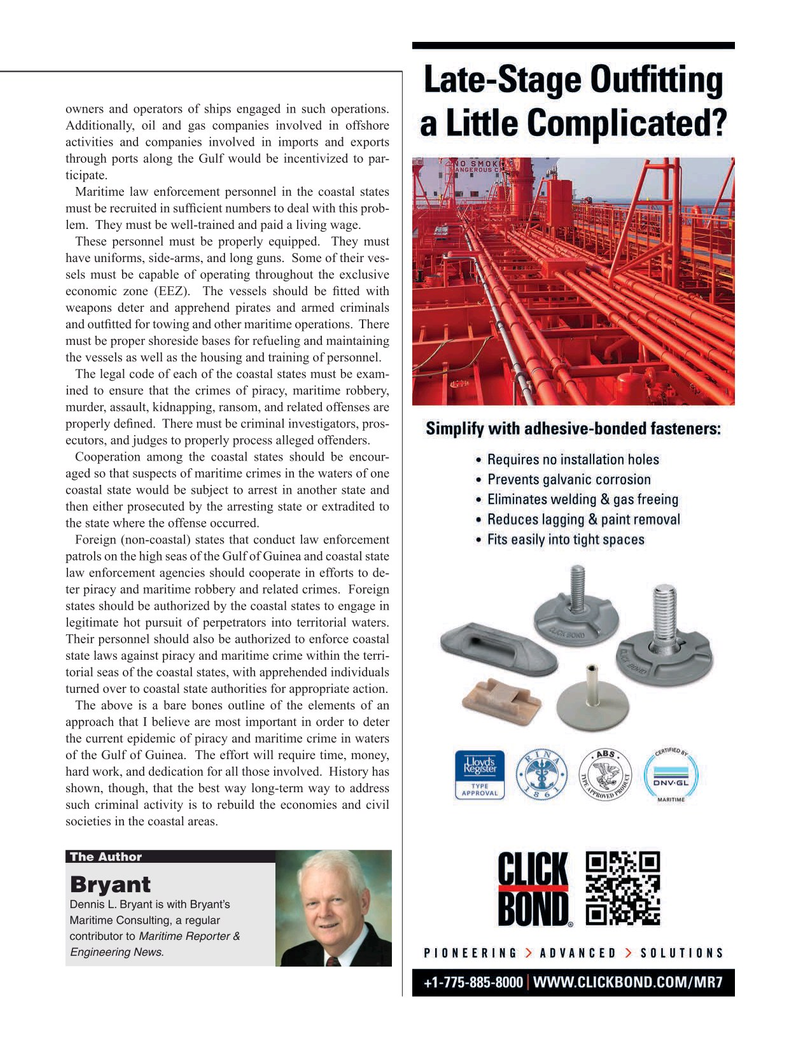
Page 17: of Maritime Reporter Magazine (April 2021)
Offshore Wind Energy: Installation, Crew & Supply Vessels
Read this page in Pdf, Flash or Html5 edition of April 2021 Maritime Reporter Magazine
owners and operators of ships engaged in such operations.
Additionally, oil and gas companies involved in offshore activities and companies involved in imports and exports through ports along the Gulf would be incentivized to par- ticipate.
Maritime law enforcement personnel in the coastal states must be recruited in suf? cient numbers to deal with this prob- lem. They must be well-trained and paid a living wage.
These personnel must be properly equipped. They must have uniforms, side-arms, and long guns. Some of their ves- sels must be capable of operating throughout the exclusive economic zone (EEZ). The vessels should be ? tted with weapons deter and apprehend pirates and armed criminals and out? tted for towing and other maritime operations. There must be proper shoreside bases for refueling and maintaining the vessels as well as the housing and training of personnel.
The legal code of each of the coastal states must be exam- ined to ensure that the crimes of piracy, maritime robbery, murder, assault, kidnapping, ransom, and related offenses are properly de? ned. There must be criminal investigators, pros- ecutors, and judges to properly process alleged offenders.
Cooperation among the coastal states should be encour- aged so that suspects of maritime crimes in the waters of one coastal state would be subject to arrest in another state and then either prosecuted by the arresting state or extradited to the state where the offense occurred.
Foreign (non-coastal) states that conduct law enforcement patrols on the high seas of the Gulf of Guinea and coastal state law enforcement agencies should cooperate in efforts to de- ter piracy and maritime robbery and related crimes. Foreign states should be authorized by the coastal states to engage in legitimate hot pursuit of perpetrators into territorial waters.
Their personnel should also be authorized to enforce coastal state laws against piracy and maritime crime within the terri- torial seas of the coastal states, with apprehended individuals turned over to coastal state authorities for appropriate action.
The above is a bare bones outline of the elements of an approach that I believe are most important in order to deter the current epidemic of piracy and maritime crime in waters of the Gulf of Guinea. The effort will require time, money, hard work, and dedication for all those involved. History has shown, though, that the best way long-term way to address such criminal activity is to rebuild the economies and civil societies in the coastal areas.
The Author
Bryant
Dennis L. Bryant is with Bryant’s
Maritime Consulting, a regular contributor to Maritime Reporter &
Engineering News.
MR #4 (1-17).indd 17 4/1/2021 2:45:11 PM

 16
16

 18
18
